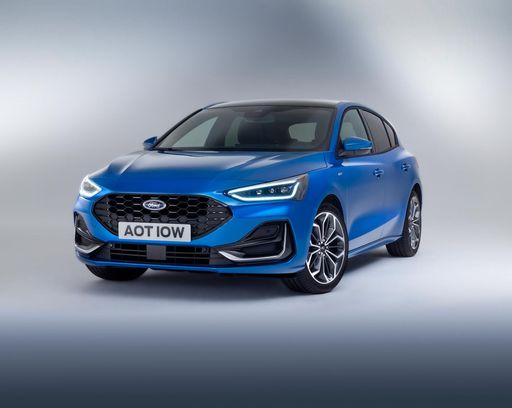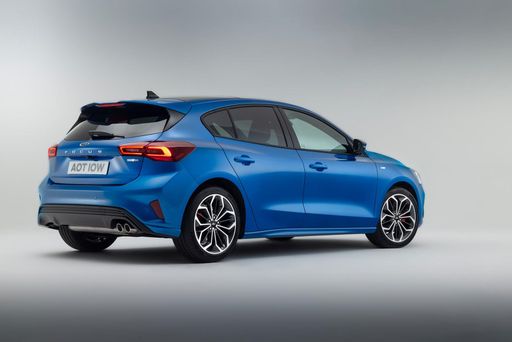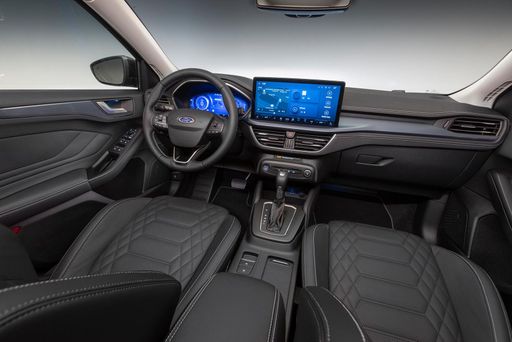Ford Focus VS Hyundai Kona
Ford Focus
The Ford Focus is celebrated for its agile handling and stylish design, making it a popular choice among hatchback enthusiasts. Its well-crafted interior offers a comfortable driving experience with intuitive technology features. Whether navigating city streets or cruising on the motorway, the Ford Focus delivers a balanced drive with impressive efficiency.
detailsHyundai Kona
The Hyundai Kona blends a bold design with a versatile interior, making it a standout choice in the compact SUV market. Its crisp handling and responsive steering provide an engaging driving experience, whether in the city or on the open road. The vehicle also offers a range of features designed to enhance comfort and connectivity, ensuring a pleasurable journey for both driver and passengers.
details @ focus.fordpresskits.com
@ focus.fordpresskits.com
 @ focus.fordpresskits.com
@ focus.fordpresskits.com
 @ focus.fordpresskits.com
@ focus.fordpresskits.com
 @ hyundai.news
@ hyundai.news
 @ hyundai.news
@ hyundai.news
 @ hyundai.news
@ hyundai.news
 @ hyundai.news
@ hyundai.news

|

|
|
|
|
Costs and Consumption |
|
|---|---|
|
Price
about 29700 - 46100
$
|
Price
about 24400 - 44800
$
|
|
Consumption L/100km
4.9 - 8
L
|
Consumption L/100km
4.5 - 6.7
L
|
|
Consumption kWh/100km
-
|
Consumption kWh/100km
14.6 - 16.8
kWh
|
|
Electric Range
-
|
Electric Range
377 - 514
km
|
|
Battery Capacity
-
|
Battery Capacity
1.3 - 65.4
kWh
|
|
co2
117 - 183
g/km
|
co2
128, 103, 141, 152, 0
g/km
|
|
Fuel tank capacity
52
L
|
Fuel tank capacity
38 - 47
L
|
Dimensions and Body |
|
|
Body Type
Hatchback
|
Body Type
SUV
|
|
Seats
5
|
Seats
5
|
|
Doors
5
|
Doors
5
|
|
Curb weight
1330 - 1529
kg
|
Curb weight
1370 - 1773
kg
|
|
Trunk capacity
392
L
|
Trunk capacity
466
L
|
|
Length
4382 - 4397
mm
|
Length
4350 - 4385
mm
|
|
Width
1825 - 1844
mm
|
Width
1825
mm
|
|
Height
1438 - 1482
mm
|
Height
1580 - 1585
mm
|
|
Payload
495 - 560
kg
|
Payload
420 - 490
kg
|
Engine and Performance |
|
|
Engine Type
Petrol MHEV, Diesel, Petrol
|
Engine Type
Petrol, Full Hybrid, Electric
|
|
Transmission
Manuel, Automatic
|
Transmission
Manuel, Automatic
|
|
Transmission Detail
Manual Gearbox, Automat. Schaltgetriebe (Doppelkupplung), Automatic Gearbox
|
Transmission Detail
Manual Gearbox, Automat. Schaltgetriebe (Doppelkupplung), Reduction Gearbox
|
|
Drive Type
Front-Wheel Drive
|
Drive Type
Front-Wheel Drive, All-Wheel Drive
|
|
Power HP
115 - 280
HP
|
Power HP
100 - 218
HP
|
|
Acceleration 0-100km/h
5.7 - 11.8
s
|
Acceleration 0-100km/h
7.8 - 13.3
s
|
|
Max Speed
186 - 250
km/h
|
Max Speed
162 - 208
km/h
|
|
Torque
170 - 420
Nm
|
Torque
200 - 265
Nm
|
|
Number of Cylinders
3 - 4
|
Number of Cylinders
3 - 4
|
|
Power kW
85 - 206
kW
|
Power kW
74 - 160
kW
|
|
Engine capacity
999 - 2261
cm3
|
Engine capacity
998 - 1598
cm3
|
|
Top speed
186 - 250
km/h
|
Top speed
162 - 208
km/h
|
General |
|
|
Model Year
2022 - 2024
|
Model Year
2024
|
|
CO2 Efficiency Class
D, G
|
CO2 Efficiency Class
D, C, E, A
|
|
Brand
Ford
|
Brand
Hyundai
|
Ford Focus
A Revamped Classic: The Ford Focus
The Ford Focus has long been a staple in the compact car market, offering a blend of practicality, performance, and affordability. With the latest iterations, Ford continues to build on this reputation, introducing a series of technical enhancements and innovative features aimed at both seasoned car enthusiasts and daily commuters alike.
Innovative Powertrains and Engine Performance
The latest Ford Focus models are equipped with a variety of engine options tailored to diverse driving preferences. At the heart of the lineup are the EcoBoost Hybrid engines, which combine efficiency with performance. These mild-hybrid petrol engines are designed to deliver responsive power with a promise of reduced emissions and fuel consumption.
For those who prefer diesel, the EcoBlue engine offers a smooth and quiet ride with impressive torque and fuel economy. Meanwhile, the high-performance ST variant, powered by a robust 280 PS petrol engine, caters to drivers seeking a sporty experience.
Driving Dynamics and Comfort
One of the Ford Focus's standout features is its superior driving dynamics, balanced perfectly between comfort and agility. Whether equipped with a manual, automatic, or dual-clutch PowerShift transmission, the Focus ensures a responsive drive that adapts to both urban and highway conditions.
The vehicle's suspension system has been finely tuned to absorb road imperfections, offering a composed ride that neither sacrifices comfort nor handling precision. With front-wheel drive across the range, the Focus provides a stable and reassuring road presence.
Efficiency and Sustainability
The Ford Focus impresses with its commitment to fuel efficiency. The EcoBoost Hybrid engines deliver consumption as low as 5.2 L/100km, while the diesel variant offers an even more frugal 4.9 L/100km. These figures not only promise reduced running costs but also lower CO2 emissions, aligning with current sustainability trends.
With CO2 efficiency classes ranging from D to G, the Focus demonstrates a strategic blend of performance and environmental consideration, an important factor for environmentally conscious drivers.
Modern Design and Versatility
In terms of aesthetics, the latest Ford Focus models feature a sleek, aerodynamic silhouette complemented by modern design cues. Ranging from the sporty ST-Line to the sophisticated Titanium editions, each trim offers a distinct personality while maintaining the Focus's core design philosophy.
The Focus continues to offer practical versatility with features like a spacious 392-litre boot, making it suitable for family trips and everyday errands. The interior is smartly designed, providing ample space for five passengers and affording a comfortable, ergonomic driving position.
Technological Enhancements
Technology in the Ford Focus reflects the needs of today's connected driver. The vehicle is equipped with the latest Ford SYNC infotainment system, featuring a user-friendly interface and seamless smartphone connectivity. Driver-assist features such as adaptive cruise control, lane-keeping aid, and traffic sign recognition enhance safety and convenience.
Moreover, the Focus offers various driving modes to tailor the driving experience to different conditions, thus ensuring that drivers have both flexibility and control at their fingertips.
Conclusion: An Evolved Icon
The Ford Focus remains a dominant player in its segment, thanks to its comprehensive suite of innovative features, efficient powertrains, and dynamic styling. This model continues to evolve, providing a balanced blend of performance, economy, and technology, making it a worthy choice for those seeking a reliable yet exciting compact car.
Hyundai Kona
The Hyundai Kona: A Comprehensive Overview
The Hyundai Kona has established itself as a standout in the compact SUV segment, blending innovation with performance and style. As the automotive world moves towards more sustainable and efficient options, the Kona offers a variety of powertrains, from traditional petrol engines to full hybrids and all-electric models.
Powertrain Options and Performance
The Hyundai Kona's powertrain choices cater to a wide range of preferences. For petrol enthusiasts, the Kona offers a 1.0L T-GDI engine, delivering 100 PS, and a more robust 1.6L T-GDI variant with up to 170 PS. Those looking for efficiency without sacrificing power can consider the full hybrid model, offering 129 PS and an impressive consumption of 4.5 L/100km.
For a greener option, the all-electric Kona provides a compelling case. With battery capacities of up to 65.4 kWh, the electric Kona offers power outputs of 156 to 218 PS, and efficiencies as low as 14.6 kWh/100km, enabling an electric range of up to 513 km.
Technical Specifications and Innovations
Built on a robust platform, the Kona delivers versatility and reliability. With a choice between manual or dual-clutch automatic gearboxes, along with options for front-wheel or all-wheel drive, the Kona ensures a tailored driving experience. The handling is enhanced by the car's lightweight construction, balancing a 1370 to 1773 kg curb weight with dynamic performance.
The Kona's design doesn't compromise cargo space for style; it offers a generous 466 L boot capacity. With a relatively compact body, measuring 4350 to 4385 mm in length, the Kona easily navigates urban environments while still commanding a strong road presence with its 1825 mm width.
Efficiency and Eco-Friendliness
Hyundai is committed to reducing emissions, as evidenced by the Kona's CO2 efficiency ratings, which range from class A for electric models to class D for some higher-performance petrol variants. The focus on reducing environmental impact without sacrificing driving pleasure is notable throughout the Kona range.
Costing and Value
The Hyundai Kona offers commendable value for money. Pricing starts at €26,400 and reaches up to €50,690, depending on the chosen configuration. The monthly running costs range from €956 to €1090, with a cost per kilometre of 38.3 to 43.6 cents, making it a competitive option in its class.
Conclusion: Modern, Efficient, and Versatile
The Hyundai Kona stands as a testament to Hyundai's commitment to innovation, efficiency, and practicality. Whether you are inclined towards a traditional combustion engine, a hybrid for a balance of power and efficiency, or a full electric model for maximum eco-friendliness, the Kona provides a tailored solution for each unique driver preference.
